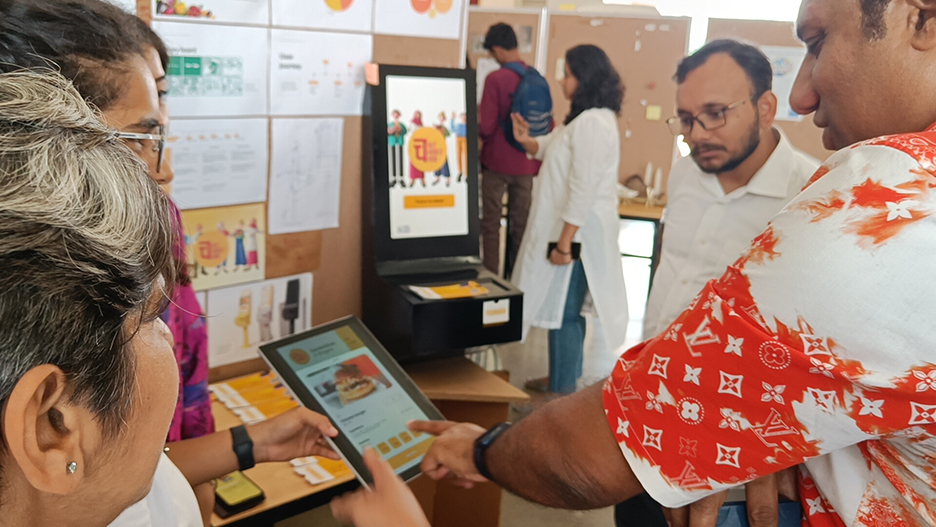“The future belongs to a very different kind of person with a very different kind of mind - creators and empathizers, pattern recognizers and meaning makers.” - Daniel H. Pink, A Whole New Mind

Collaboratively Reimagining Rural Adolescent Health Experiences. Workshop: Future of Interaction Design. In collaboration with Jatan Sansthan, Udaipur. Image Source: Naveen Bagalkot.

Creating interactive prototypes to engage audiences to iteratively improve a service experience. Studio & Workshop: Design Research & Interaction Design in Practice. Project: Reimagining Campus Food. Image Source: Vineeta Rath.
Is yet another app a real solution for someone addicted to their phone or to social media? Is navigating to a new location using a phone-based app while riding a bike the safest interaction one can design for a delivery person? Is Virtual Reality, with its dazzling capabilities to deliver immersive experiences an all innocent technology without its own limitations? These are just some of the many inescapable ‘wicked questions’ the Experience Designer must wrestle with in practice.
Experience Design focuses on shaping the digital material for enabling better experiences while interacting with, using, and living with a product, service, or a system. Although digital technology is the primary ‘material of play’ for an Experience Designer, this program is not limited by it. While Aspiring Experience Design Practitioners are informed by their quest to create opportunities for humans to be able to enhance their own lived experiences - with and through technologies as the creators, facilitators, and mediators of those experiences - they remain cognisant of how their proposed human interventions might impact both existing human and more-than-human systems they eventually get embedded in.
Vision
The vision of the Postgraduate Program in Experience Design at Srishti Manipal Institute is to nurture balanced practitioners and reflective makers in the field of Experience Design practice. A balanced practitioner who is proficient in both effectively and ethically responding to the current demands of the field of Experience Design, and is a reflective maker who, through reflection-in-action informs and enriches the broader field through their own conscious experimentation and knowledge building practices.
With the creative confidence to thoughtfully navigate the inevitable complexities and uncertainties that accompany the shaping of current and future technologies, this program aims to equip you to both sensitively question and playfully explore beyond the current ways and notions of practicing ‘User Interface/User Experience (UI/UX) Design’ today. You are expected to consciously push the boundaries of this evolving field, and challenging status quos through a deeper understanding of contexts, insightfulness, self-reflexivity, intensive and iterative making, a strong bias for being collaborative and empathetic, and a real willingness to engage with complexity.
Your learning journey in the program is ground up - dismantling current understandings around experiences, before proceeding to build for experiences in the real, lived world. As an aspiring practitioner-inquirer, you will begin by unpacking the very conception of ‘experience design’ by asking more fundamental questions such as:
- What is an experience? And, where is it situated, really?
- What are the elements of an experience?
- What is design in the realm of experiences? Can experiences intentionally be ‘designed’ for - if at all?
Further, recognizing how the current human paradigms are rapidly shifting from dominant notions of ‘convenience, efficiency and usability’ to those of ‘ecological consciousness, social equity, well-being and care’, the inquiries advance to how might we:
- Attentively understand the intricacies of human-technology interactions i.e. the nuances of the human and non-human somas and their complex relationships.
- Sensitively build within complex socio-cultural contexts such as that of India, and create futuristic, yet authentic experiences for its populace?
- Consciously design with cognizance to the environment and more-than-human systems?
- Creatively speculate, envision, and inform future technologies that respect the ecosystems they eventually become part of?
Your own practice emerges over time as you continually engage with theories, methodologies and approaches that transcend disciplines, focusing on advancing the key skills of recognizing patterns, making connections, while you also begin to understand experiences beyond the cognitive, by exploring the embodied and somesthetic approaches of shaping human encounters with technology, broadly defined, through critical inquiry and practical exploration.
Therefore, if you seek to develop criticality in your approach, believe that design or technology alone cannot solve problems, and if you want to consciously explore a more humble, integrated approach to see the possibilities on taking an experience driven approach to the design of digital technologies, this program is for you.
Learning Approach
Learning at the postgraduate level is driven by published lines of inquiries that is enacted through studio based learning, workshops, theoretical reflections and field work. This approach cultivates a creative practice through engagement in diverse contexts, collaborative and participatory approaches leading to knowledge development.
Program learning approaches include:
- A theoretical and historical knowledge of philosophies and methods of shaping human experiences with digital technology.
- Methods of Hands-on and critical making as means of research and design.
- Methods of speculative and participatory creativity and research.
- Frameworks and methodologies of ethical perspectives and self-reflexivity while designing for experiences.
Capability Sets
Upon successful completion of the course, graduates will have the capabilities to:
- Understand Experiences: Observe and systematically evaluate everyday human activities and develop an empathetic and nuanced understanding of the human, lived experience.
- Understand Contexts and be Insightful: Engage with multiple forms of data sourced from multiple stakeholders through participatory methods and synthesize into novel insights that will inform design.
- Position self in practice: Discern and align to develop an informed stance on historical, current and emerging trends about the relationship between the embodied and lived experiences and technology through conscious perceiving, questioning, and distinguishing between information from different sources, theories and knowledge forms.
- Adopt a multidisciplinary approach: to problem-solving or enhancing experiences and develop divergent and convergent design thinking abilities and make connections, to convert the empathetic insights from research into purposeful and value-laden concepts.
- Negotiate complexities at a systems-and-services level: Comprehend and negotiate the complex dynamics and interdependencies between the audience, culture, ecology, business, design and technology through analytical, critical and strategic thinking at a systems-and-services level.
- Make to iterate and reflect: with multiple media and materials and technological artifacts for iterative or critical evaluation.
- Communicate compellingly: the design process to invite critique and develop a community of stakeholders for the work.
- Practice Responsibly: Be aware of, transparent and ethical in acknowledging and articulating one’s position with respect to the social, cultural, and political implications of technology, and one’s design interventions.
Opportunities
The above-mentioned capability sets could lead to opportunities such as:
- Employment in design studios, R&D, product development teams in small and large corporations and start-ups focusing on design research, strategic user experience design, strategic service design, interaction design and user-interface design.
- Employment in start-ups, small and medium enterprises, NGOs & social enterprises focusing on both product design and service-system design.
- Employment in the Information Technology industry with a focus on user experience, user interface and experience design, and strategic service design.
People
Enquiries

Disciplines
The program is informed by the following learning disciplines:
- Industrial Design – namely Product Design, Furniture Design & Services and Systems
- Visual Communication Design
- Anthropology
- Sociology
- Cognitive Psychology
- Cultural Studies
- Sustainability
- Information Technology
Research and Collaboration
The students under this course will have the opportunity to work with the following centers and labs at Srishti Manipal.
FAQs
Experience Design focuses on shaping the digital material for enabling better experiences while interacting with, using, and living with a product, service, or a system. Although digital technology is the primary ‘material of play’ for an experience designer, this program is not limited by it. The larger vision is informed by the quest to create opportunities for people to be able to enhance their lived experiences - with and through technologies as the creators, facilitators and mediators of those experiences.
Digital technology is becoming the core of most, if not all, aspects of human experiences. We are living, apparently, in an experience economy. Shaping the complex digital material then takes on a central role to shape experiences that are beneficial, pleasurable, and not harmful. Experience design brings together a deeper knowledge about experiences as well as digital technologies to shape better human experiences.
If you are excited about experiences that we have when using and living with digital products, services and systems, and want to shape these experiences, then the program is suited for you. You are driven by a desire to shape the digital material, in combination, with other socio-material aspects, into something that offers more equitable and accessible experiences. You seek to develop criticality in your approach and do not believe that design or technology alone can solve problems, and they do in fact create more problems than they claim to solve. And you want to yet explore a more humble approach to see what possibilities do lie in taking an experience driven approach to design of digital technology.
Your learning in the program is informed ground up, through first dismantling and understanding experiences, and then moving on to build for experiences in the real, lived world. You will engage with theories, methodologies and approaches that transcend disciplines, and focus on advancing the key skills of recognizing patterns, making connections and applying “whole-brain” thinking which is informed primarily by “doing” and “experiencing”. You will move across disciplinary and trans-disciplinary learning and engagements in-situ, a process of independent practice emerges, forming the abilities to speculate, critically make, discern and align, as well as being ethically responsible. In contrast to the accepted parlance of ‘User Interface/User Experience (UI/UX) Design’, as prevalent today, we expect you to push the boundaries of the field of designing experiences for tomorrow. Such a challenging of status-quo is based on a deep understanding of contexts, insightfulness, self-reflexivity and a strong bias for being collaborative and empathetic, and engaging with complexity, and intensive and iterative making.
A postgraduate program in Experience Design is an ideal qualification for those students who wish to pursue a career that entails researching, imagining, planning and engaging with a wide range of stakeholders towards designing just, equitable and accessible experiences with digital systems and infrastructures. The program offers you a platform to develop an individual practice, towards pushing the social, cultural, economic and political status quo about the role digital technology could and should play in shaping our experiences.
You could work in product and service industry and start-ups, join a design firm offering user and design research and experience design services to a range of clientele, or work in the not-for-profit sector designing digital experiences. The program also allows you to apply into a PhD program in a related area.
All admission and fee related information could be viewed on our admissions page.


